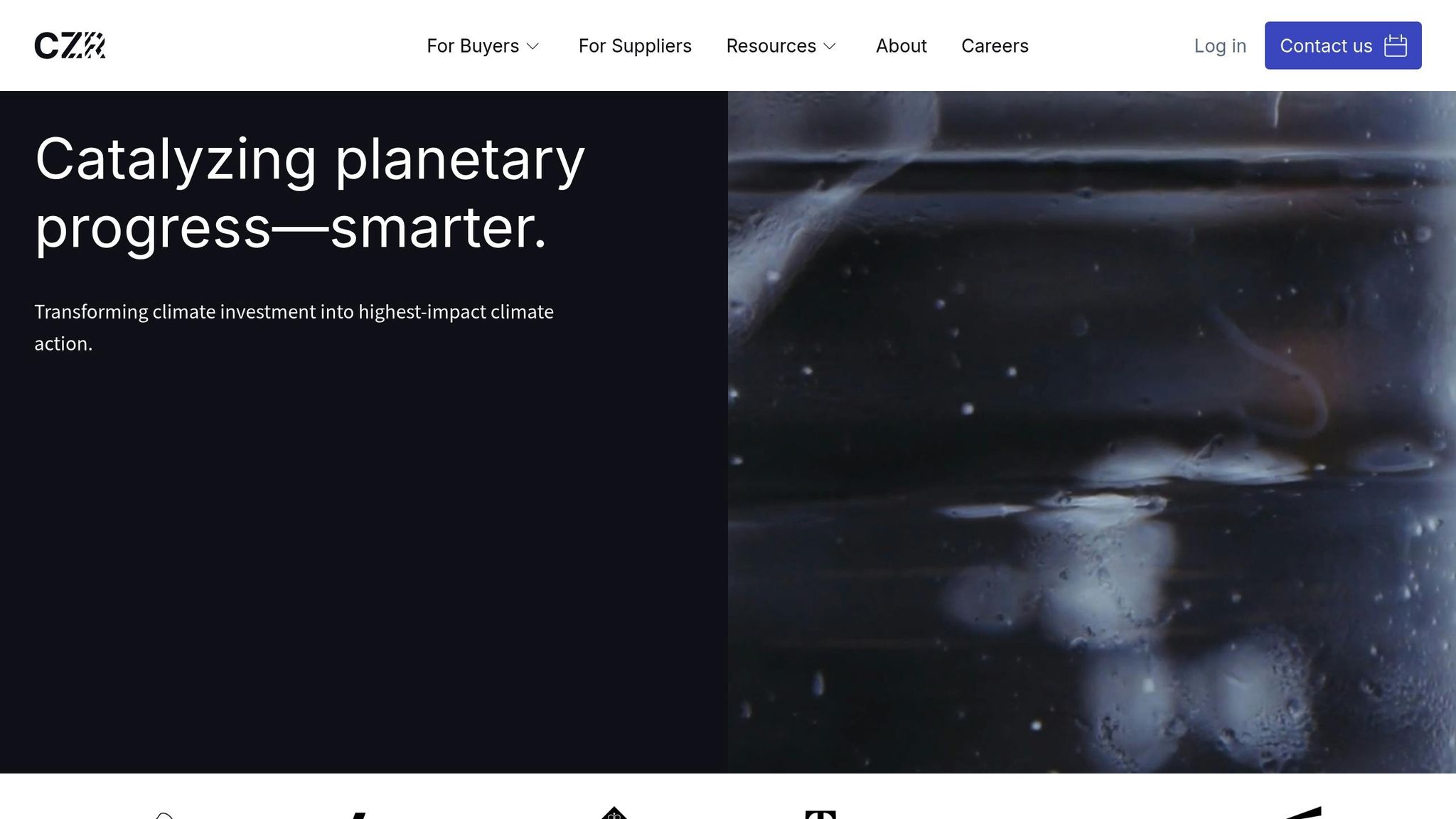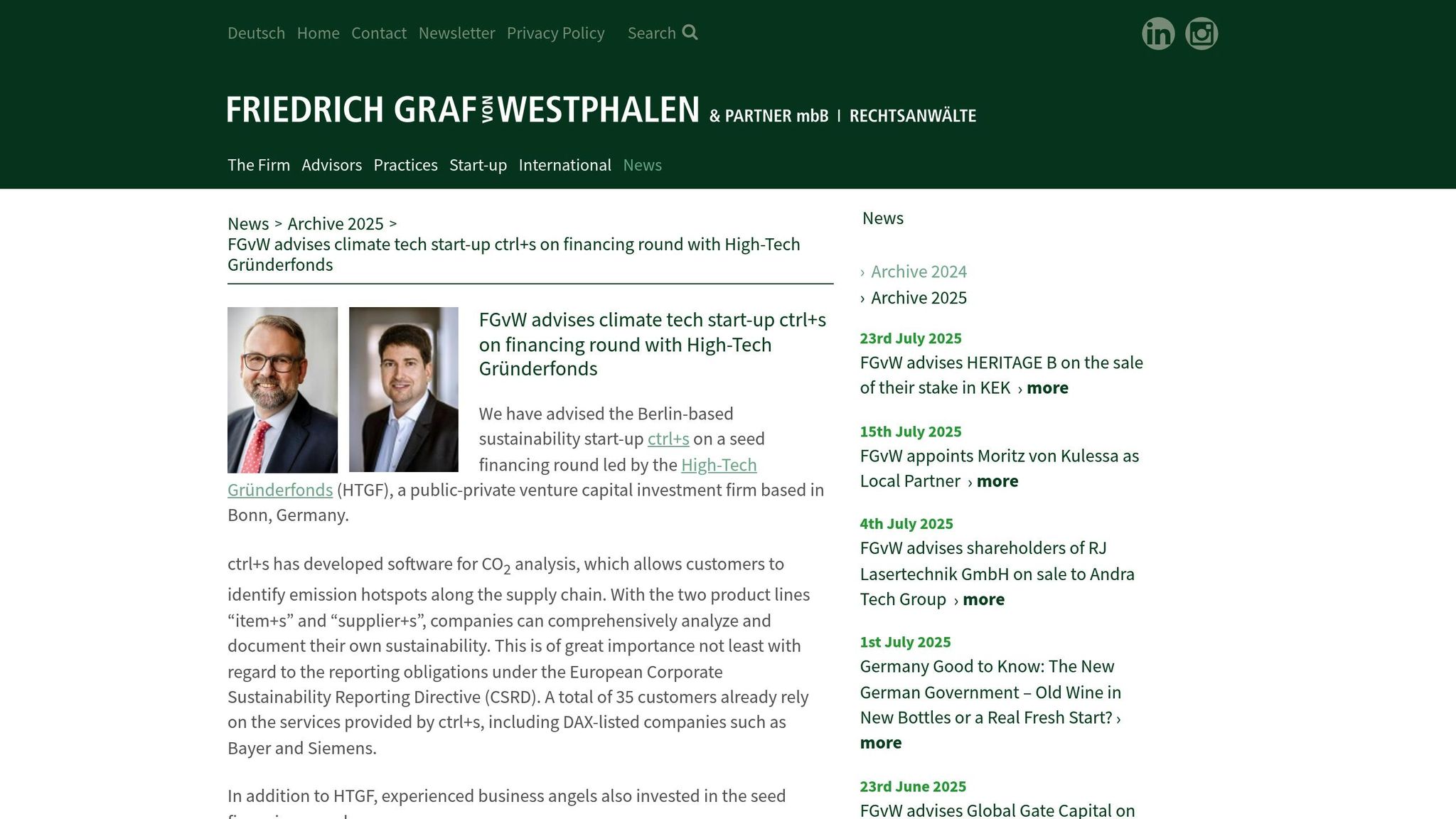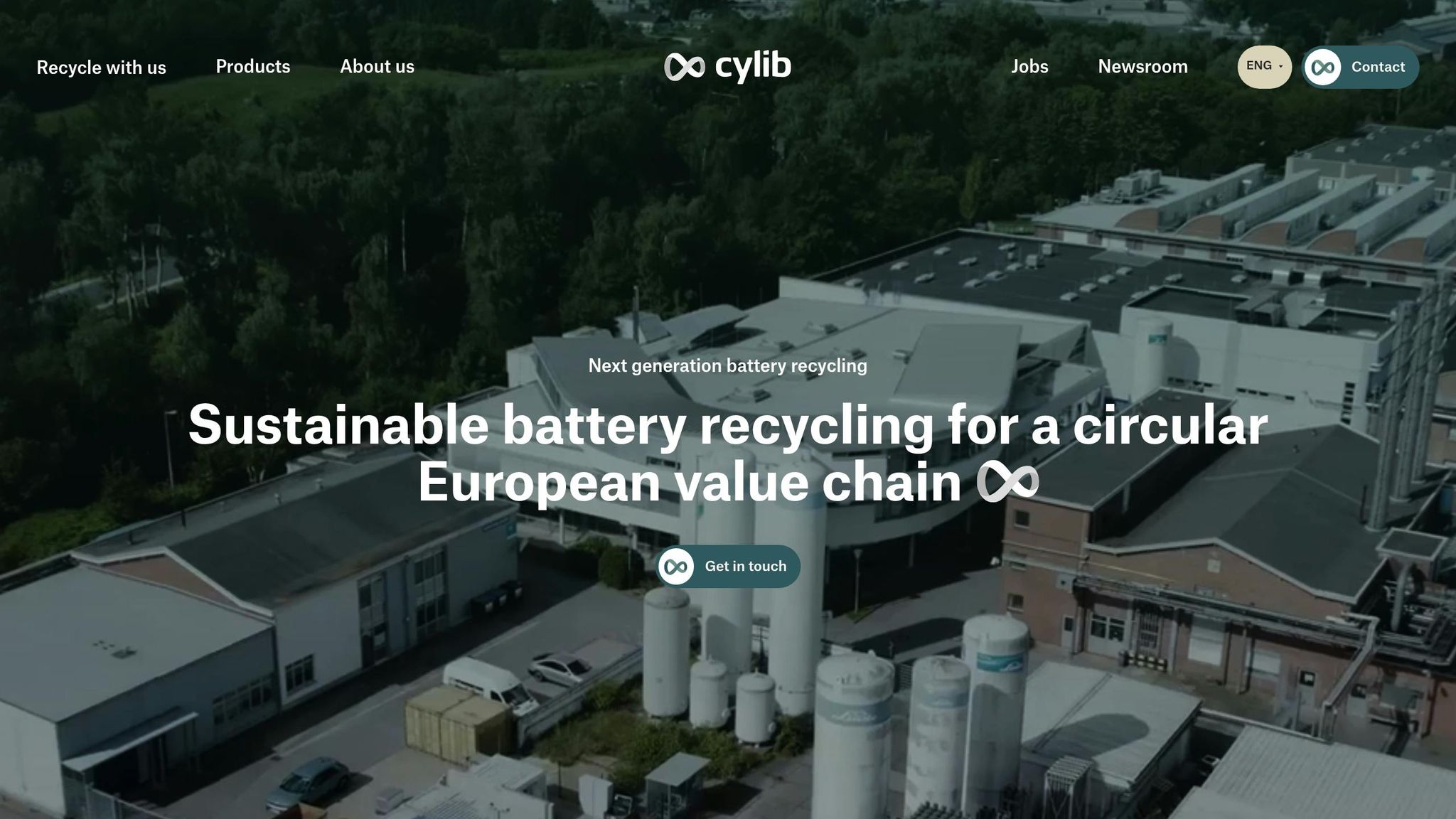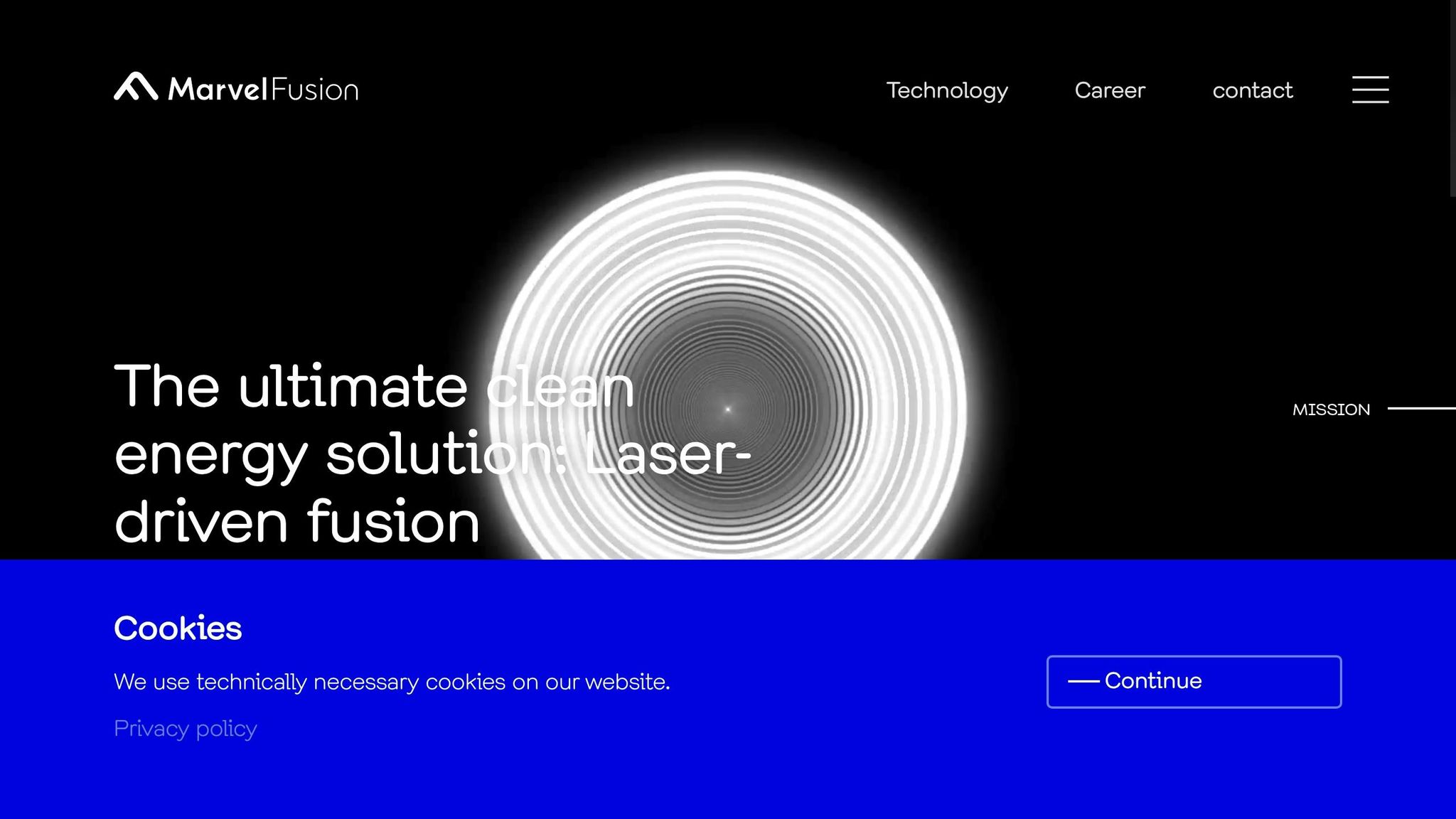Internal CO₂ Pricing: A Strategic Tool for Sustainable Business Decisions
An internal CO₂ price helps companies integrate their emissions into business decisions and prepare...
By: Johannes Fiegenbaum on 8/2/25 9:16 AM

2025 marks a turning point for the ClimateTech sector. While investments dropped to €2.3 billion in the first quarter—the lowest level since 2020—start-ups with clearly measurable CO₂ reductions and solutions for meeting strict EU regulations are gaining importance. The spotlight is especially on innovations that help companies comply with the Corporate Sustainability Reporting Directive (CSRD) and the EU Taxonomy. This shift is not only a response to regulatory pressure but also to the growing demand from investors and consumers for transparent, impactful climate solutions. According to PwC’s State of Climate Tech 2023, investors are increasingly prioritizing start-ups that can demonstrate both verifiable emissions reductions and a clear pathway to compliance with evolving EU standards.
Four German start-ups stand out:
These companies demonstrate different approaches, from short-term CO₂ reduction to long-term energy solutions. Despite the challenging investment climate, they are betting on strong technologies and a clear alignment with EU requirements. This trend reflects a broader European movement, as highlighted by EU-Startups, where the focus is shifting toward start-ups with robust regulatory alignment and demonstrable climate impact.

CEEZER is developing a central platform for the voluntary carbon market, supporting companies in creating strategic CO₂ portfolios. The Berlin-based start-up relies on a data-driven approach to efficiently manage the complexity of the carbon market and the diversity of available credit types. This approach is increasingly important as companies face mounting pressure to not only offset emissions but also ensure the credibility and traceability of their carbon credits, a concern echoed by the 2024 Voluntary Carbon Market Outlook.
CEEZER’s platform is based on a proprietary evaluation framework that analyzes climate protection projects according to factors such as impact, political framework, and market conditions. This enables precise quality and risk standards to be defined. The underlying database includes technologies such as biochar and mineralization. In addition, the platform offers flexible purchasing options—from spot purchases and forward contracts to long-term offtake agreements—adaptable to individual budgets and timelines.
CEEZER’s potential is especially evident through the Carbon Coalition, an accelerator program for start-ups in the carbon dioxide removal (CDR) space. One cohort of this program plans to permanently remove 2.5 million tons of CO₂e by 2030. For comparison: only 0.75 million tons of CO₂ have been removed worldwide so far, while the target is 10 gigatons by 2050. This ambitious scale aligns with findings from Carbon Removal Europe, which stresses the need for rapid upscaling of CDR solutions to meet global climate targets.
A concrete example of CEEZER’s application is UNDO’s 2023 project, which built a sustainable mobile network in Belgium and permanently offset CO₂ emissions. Similarly, neoom has integrated the technology into its neoom GREEN product, allowing customers to actively participate in carbon offsetting. These results show how CEEZER has been able to expand its influence despite a difficult investment climate.
CEEZER is also well positioned financially: On January 25, 2024, the company closed a Series A funding round of €10.3 million. The round was led by HV Capital, with participation from Norrsken VC, Picus Capital, and Carbon Removal Partners. This investment is particularly noteworthy given the overall declining investment climate—European ClimateTech investments fell to €2.3 billion in Q1 2025.
David Kuczek, General Partner at HV Capital, praised CEEZER’s approach:
“CEEZER is at the forefront of building key infrastructure for the voluntary carbon market. They offer unparalleled transparency and streamline transactions... Through a data-driven and holistic approach, CEEZER has established itself as the primary platform for corporate buyers of carbon credits seeking impactful portfolio compensation solutions.”
Magnus Drewelies, CEO of CEEZER, commented on German climate policy:
“The inclusion of carbon removals in the coalition agreement is a strong signal. Germany recognizes that true net zero is not possible without CDR. Now is the time to focus on combining speed, quality, and market-based mechanisms to position Europe as a leading hub for CO₂ removal.”
Market dynamics underscore CEEZER’s strategic role: sales of permanent CDR solutions rose an estimated 300 percent year-over-year. At the same time, there are significant price differences—removal credits cost around €21 per ton, while avoidance credits have dropped below €4 per ton. This price disparity is highlighted in recent market analyses, emphasizing the growing premium on high-quality, verifiable removals.

The Munich-based start-up ctrl+s specializes in optimizing Scope 3 emissions in supply chains. With a data-driven platform, the company tackles one of the biggest challenges in climate protection: 80 percent of total corporate emissions come from the supply chain. This mirrors a broader industry challenge, as highlighted by McKinsey, which notes that supply chain emissions often dwarf direct emissions and are notoriously difficult to measure and manage.
ctrl+s’s platform uses a combination of statistical models and supplier data to precisely analyze emissions and identify targeted reduction potential. This enables companies to make strategic decisions based on solid data, without having to conduct labor-intensive data collection themselves.
Johannes Scholz, co-founder and managing director of ctrl+s, describes the company’s approach:
“Many companies set ambitious climate goals, but the real challenge lies in avoiding resource-intensive data collection that doesn’t significantly move them closer to their targets. Our platform provides strategic procurement teams with a robust data foundation for precise decision-making—and the essential tool to act and effectively reduce emissions.”
ctrl+s’s technology enables CO₂ management across more than 10,000 suppliers and is already used by well-known companies such as Siemens and TÜV Süd. This provides concrete approaches for systematically reducing emissions.
Thanks to the platform’s precise data foundation, companies can achieve significant emission reductions. The potential is particularly evident in collaboration with large enterprises: the platform not only identifies emission sources but also provides clear action recommendations to reduce them. By combining scientific methods with practical feasibility, it becomes possible to effectively address Scope 3 emissions. According to CDP, companies that actively manage supply chain emissions can reduce their overall carbon footprint by up to 35%.
In February 2025, ctrl+s closed a seed funding round of €1 million. The round was led by the High-Tech Gründerfonds (HTGF), supported by angel investor Benjamin Schulz. Notably, ctrl+s is already profitable and plans to invest the funds primarily in further technology development and sales expansion.
Christian Arndt, Principal at HTGF, emphasized the conviction behind the investment:
“The team combines deep scientific expertise with practical application. We are convinced that ctrl+s will play a key role in reducing emissions in global supply chains.”
With powerful technology and a solid financial base, ctrl+s helps companies meet current EU regulatory requirements. The platform is specifically tailored to the Corporate Sustainability Reporting Directive (CSRD) and the Corporate Sustainability Due Diligence Directive (CSDDD). With the new funding, ctrl+s plans to further scale its technology and expand into additional European markets. The increasing regulatory scrutiny on supply chain emissions, as outlined in the EU’s CSDDD, makes ctrl+s’s solution especially timely and relevant.

The Aachen-based start-up Cylib is dedicated to the challenge of recycling lithium-ion batteries in an environmentally friendly and efficient way. With its key technology, the OLiC process (Organic Lithium Carbonate), the company is making a clear contribution to the circular economy, addressing one of the central questions of electromobility: the sustainable recovery of valuable raw materials from old batteries. The urgency of battery recycling is underscored by the IEA’s Global EV Outlook 2024, which forecasts a surge in end-of-life batteries as electric vehicle adoption accelerates.
The heart of Cylib is the OLiC process, which is based on a water-based approach. This drastically minimizes the use of additives and acids. With a recycling efficiency of over 90 percent, it is possible to recover almost all key raw materials such as lithium, graphite, cobalt, nickel, and manganese from the so-called “black mass”—the shredded material from old batteries. This method significantly outperforms conventional processes and enables nearly complete material recovery. In addition to high efficiency, the process also significantly reduces CO₂ emissions.
The OLiC process reduces the carbon footprint by an impressive 80 percent compared to primary raw material extraction and even outperforms common recycling methods by 30 percent. Batteries produced with Cylib’s recycled materials cause up to two-thirds fewer emissions than those made from primary materials. In the long term, Cylib’s technology could save 118.0 million tons of CO₂e annually by 2040. This aligns with Transport & Environment’s findings that advanced battery recycling is critical for decarbonizing transport and reducing Europe’s reliance on imported raw materials.
The latest funding rounds underscore the scalability and practical relevance of the technology. In May 2024, Cylib raised €55 million in a Series A funding round. Investors include Porsche Ventures, Bosch Ventures, the DeepTech & Climate Fund, NRW.Ventures, World Fund, Vsquared, Speedinvest, and 10X Founders.
Additionally, in November 2024, the company received a double-digit million grant from the Ministry of Economic Affairs, Industry, Climate Protection and Energy of North Rhine-Westphalia. These funds are being used to build the company’s first industrial battery recycling plant. Dr. Lilian Schwich, founder and CEO of Cylib, commented:
“This funding is a significant step in expanding our innovative recycling technology and contributing to the circular economy.”
The planned plant in Dormagen is set to recycle 10,000 tons of black mass annually from 2027 onwards—equivalent to about 30,000 tons of old batteries.
Cylib is strategically positioned in line with current EU regulations. The EU Battery Regulation requires recyclers to recover at least 50 percent of the lithium content from battery waste by the end of 2027—rising to at least 80 percent by 2031. With a recycling efficiency of over 90 percent, Cylib already meets and exceeds these requirements.
Moreover, the company makes an important contribution to the EU Critical Raw Materials Act by recovering valuable materials such as lithium, graphite, cobalt, nickel, and manganese. Dr. Gideon Schwich, co-founder and COO of Cylib, explained:
“Especially at a time when the manufacturing industry in Germany and Europe is facing major challenges and federal and state budgets are tight, this funding is an outstanding signal of the will to establish a circular economy in NRW and underlines the importance of this project.”
The EU Battery Regulation also sets clear targets for 2030: at least 70 percent of lithium and 95 percent of cobalt, nickel, and copper must be recovered from old batteries. With its recycling service, Cylib offers companies a reliable way to meet these requirements.

Marvel Fusion expands the ClimateTech spectrum by going beyond pure CO₂ reduction strategies to focus on CO₂-free energy generation. The Munich-based start-up is betting on innovative nuclear fusion technologies that promise an almost unlimited and clean energy source—without long-lived radioactive waste. With its laser-based inertial fusion, Marvel Fusion addresses one of the biggest challenges of the energy transition: providing sustainable energy. The company demonstrates how alternative approaches can enrich the ClimateTech sector. As IEA and the European Commission highlight, fusion energy is increasingly viewed as a potential game-changer for Europe’s long-term energy security and decarbonization goals.
Marvel Fusion relies on inertial confinement fusion. Here, ultra-fast laser pulses trigger small fusion reactions, with state-of-the-art laser technology significantly improving efficiency and performance over older approaches. The fuel used—a mixture of hydrogen and boron—remains solid at room temperature, and instead of complex gold hohlraums, simplified silicon nanostructures are used. Moritz von der Linden, co-founder and CEO, describes this development with a wink:
“When the physicists found out that silicon works better, the target developers were thrilled: ‘Hallelujah! We can use standard lithography from chip manufacturing.’”
Marvel Fusion’s technology promises a completely CO₂-free energy source, also free of long-lived radioactive waste. This could significantly reduce dependence on fossil fuels. The goal: to have a commercial fusion power plant in operation by 2036. The European Commission highlights the enormous potential of this technology—for both Europe’s competitiveness and its strategic autonomy. Moritz von der Linden emphasizes the urgency:
“Fusion needs to come quickly and it needs to be cheap. Otherwise, no one needs it, and no one will be willing to pay for it.”
Recent breakthroughs in fusion, such as the U.S. National Ignition Facility’s achievement of net energy gain in 2022, have reignited optimism about the commercial viability of fusion within the next decade.
In a Series B extension, Marvel Fusion raised €113 million, bringing total funding to an impressive €385 million (including €170 million from private investors and €215 million from public cooperation projects). The round was supported by EQT Ventures, Siemens Energy Ventures, and the European Innovation Council (EIC) Fund. The funds are being used, among other things, to build a $150 million laser facility in cooperation with Colorado State University and in partnership with Siemens Energy. Moritz von der Linden commented:
“Welcoming the EIC Fund, EQT Ventures, and Siemens Energy to our shareholder base is fantastic; it gives us the financial and operational support to achieve the necessary milestones on the way to building the world’s first fusion prototype.”
Marvel Fusion benefits from the strategic importance of fusion energy within European energy policy. The European Innovation Council Fund’s investment underscores Europe’s commitment to this technology as a strategic element. Germany plans to build its first nuclear fusion power plant by 2040, while Marvel Fusion aims to construct a prototype plant by 2032. These regulatory frameworks reflect the growing interest in forward-looking energy solutions. Svetoslava Georgieva, Chair of the EIC Fund Board, emphasized:
“The participation of the European Innovation Council Fund represents significant progress and demonstrates the EIC’s commitment to high-impact innovations from private fusion companies, in line with the position of fusion technology as a strategic technology for Europe.”
Juha Pankakoski, Executive Vice President Global Functions at Siemens Energy, also expressed optimism:
“We have long been connected with Marvel Fusion and are bringing our expertise to the table. We look forward to continuing our joint work. We hope this important technology becomes a reality and enables reliable energy. When that day comes, Siemens Energy will be ready to be at the forefront.”
The effectiveness of CO₂ reduction varies by approach. Cylib and Marvel Fusion offer direct and measurable savings, while CEEZER and ctrl+s unfold their impact through market mechanisms and optimizations.
The market readiness of the startups also varies considerably. While CEEZER and ctrl+s are already generating revenue, Cylib and Marvel Fusion are still in the development phase. These differences influence the investment risk and growth potential of the companies.
The presented technologies and financing strategies paint a clear picture of the current trend: Four ClimateTech startups show how they can benefit from the VC wave of 2025.
Some of these startups focus on short-term measurable CO₂ reductions, while others are betting on long-term technological developments to make CO₂-free energy a reality. With 36 cleantech VC deals in the first quarter of 2025, Germany maintains its position as a European leader.
The sector is undergoing structural change: While only €2.3 billion was invested across Europe in Q1 2025 – a historic low – AI-based climate solutions convinced investors with €6 billion and a 14.6% share of total volume in the first three quarters of 2024. These figures illustrate not only changes in the financing market but also the diversity of innovation strategies.
With the Net Zero Industry Act, the EU aims to cover 40% of cleantech demand from domestic production by 2030. For German startups, this means better market opportunities and clearer regulatory frameworks.
Interestingly, investors are increasingly focusing on early-stage investments and groundbreaking technologies, while capital-intensive scale-ups are receiving less attention. The four featured startups – CEEZER with its carbon market platform, ctrl+s with supply chain optimization, Cylib in battery recycling, and Marvel Fusion with fusion energy – benefit from this development thanks to their specific technological orientations.
In the long term, startups that can demonstrate both measurable CO₂ reductions and strong regulatory support will become increasingly important. The trend is clear: The combination of short-term achievable CO₂ effects and long-term technological breakthroughs forms the foundation for the next phase in the European ClimateTech sector. With initiatives such as the planned €100 billion Clean Industrial Deal from the EU, Germany's position as a leading cleantech location will be further strengthened.
Even though the investment climate is currently challenging, there are certainly opportunities for ClimateTech startups in Germany to benefit from a new wave of venture capital investments. The key lies in developing technologies that enable measurable CO2 reductions and directly address the growing need for sustainable solutions.
Another focus for investors remains deeptech, especially when combined with European funding programs that promote long-term investments in climate protection projects. These developments offer startups the opportunity to stand out with innovative approaches and strategically leverage the growing interest in green technologies.
EU regulations play a central role in the development and scaling of ClimateTech solutions. With stricter requirements for reducing CO₂ emissions, they provide important impulses for technological innovations. At the same time, they also bring challenges, especially for startups that have to deal with complex and often regionally different regulations.
Despite these hurdles, regulations in Germany and the EU also offer significant opportunities for ClimateTech companies. They create a reliable framework that promotes innovation and paves the way to a climate-friendly economy. Particularly interesting: Startups that respond early to regulatory requirements can gain a long-term competitive advantage and position themselves as pioneers in a growing market. The combination of clear requirements and the need for sustainable technologies thus opens up not only risks but also significant potential.
Startups like Marvel Fusion and Cylib play a central role in reducing CO₂ emissions and shaping the energy transition. Both companies are developing technologies that have the potential to sustainably transform energy supply and resource utilization.
Marvel Fusion focuses on nuclear fusion – an energy source considered almost inexhaustible and emission-free. If this technology is successfully implemented, it could fundamentally transform the way we generate energy.
Cylib, on the other hand, has specialized in battery recycling. Through more efficient processes, the circular economy is strengthened and dependence on scarce raw materials is reduced. This is particularly important for the expansion of renewable energies and the decarbonization of the transport sector.
Both startups thus contribute significantly to the sustainable energy transition and to achieving climate goals.

ESG and sustainability consultant based in Hamburg, specialised in VSME reporting and climate risk analysis. Has supported 300+ projects for companies and financial institutions – from mid-sized firms to Commerzbank, UBS and Allianz.
More aboutAn internal CO₂ price helps companies integrate their emissions into business decisions and prepare...
The strategic choice between carbon offsetting and direct emissions reduction has become more...
More and more companies in Germany are directly linking bonuses to CO₂ reduction targets. Why?...